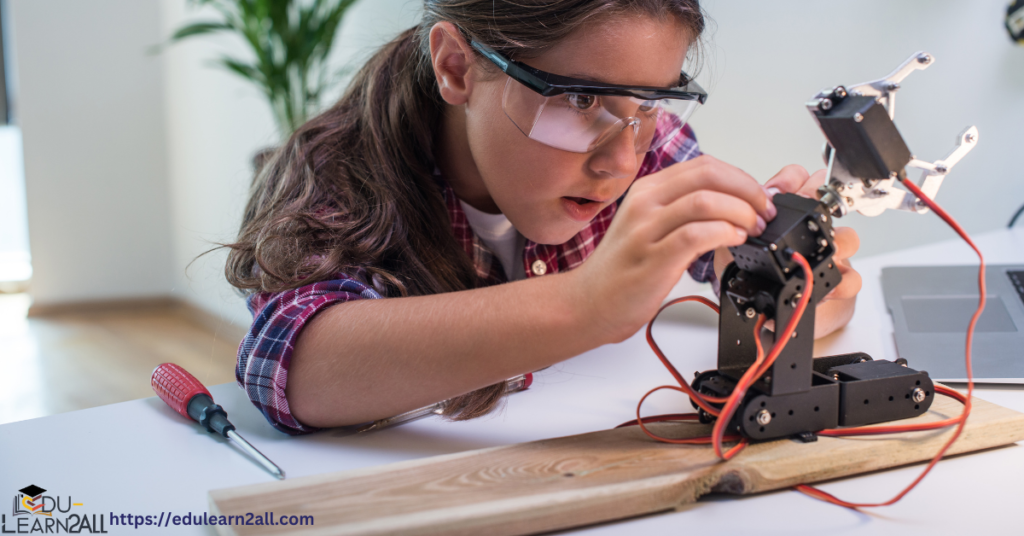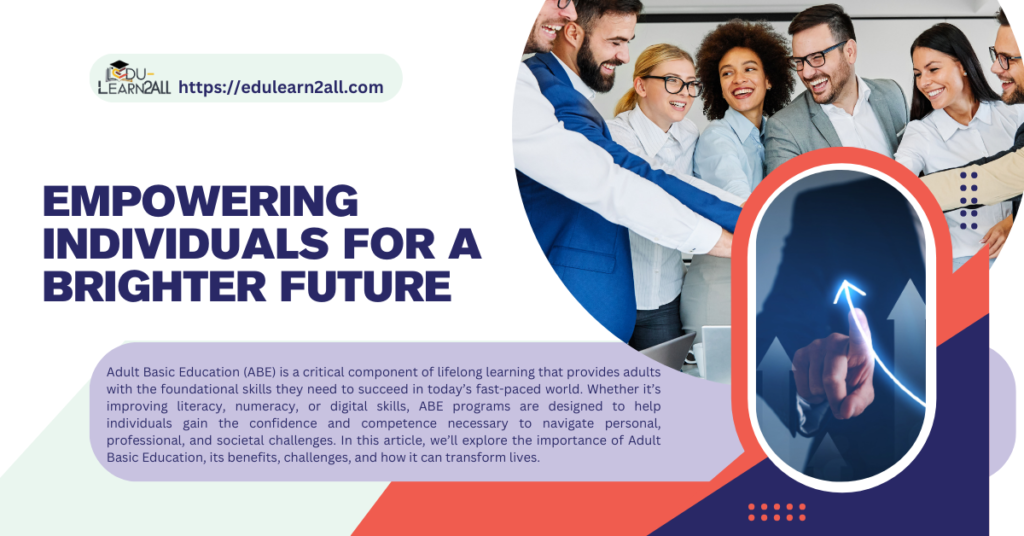Introduction
Adult Basic Education (ABE) is a critical component of lifelong learning that provides adults with the foundational skills they need to succeed in today’s fast-paced world. Whether it’s improving literacy, numeracy, or digital skills, ABE programs are designed to help individuals gain the confidence and competence necessary to navigate personal, professional, and societal challenges. In this article, we’ll explore the importance of Adult Basic Education, its benefits, challenges, and how it can transform lives.
What is Adult Basic Education?
Adult Basic Education refers to educational programs aimed at helping adults improve their basic skills. These skills typically include reading, writing, mathematics, and English language proficiency. ABE programs are often tailored to meet the unique needs of adult learners, many of whom may have had limited access to formal education earlier in life.

The primary goal of ABE is to equip adults with the tools they need to achieve personal goals, secure employment, and participate fully in their communities. These programs are often offered through community colleges, non-profit organizations, and online platforms, making them accessible to a wide range of learners.
The Importance of Adult Basic Education
1. Bridging the Education Gap
Many adults around the world lack basic literacy and numeracy skills due to various reasons, such as poverty, conflict, or lack of access to education. ABE programs play a vital role in bridging this gap, enabling individuals to catch up and build a strong foundation for further learning.
2. Enhancing Employability
In today’s competitive job market, basic skills are essential for securing and retaining employment. ABE programs help adults develop the skills needed to perform well in the workplace, such as communication, problem-solving, and digital literacy.

3. Promoting Social Inclusion
Education is a powerful tool for social inclusion. By improving basic skills, ABE programs empower individuals to participate more actively in their communities, engage in civic activities, and advocate for their rights.
4. Supporting Lifelong Learning
Adult Basic Education is often the first step in a lifelong learning journey. By building confidence and foundational skills, ABE programs encourage adults to pursue further education and training, opening doors to new opportunities.

Key Components of Adult Basic Education
1. Literacy Development
Literacy is the cornerstone of ABE. Programs focus on improving reading and writing skills, enabling adults to comprehend written materials, express themselves clearly, and engage with information effectively.
2. Numeracy Skills
Numeracy skills are essential for everyday tasks, such as managing finances, measuring ingredients, or understanding schedules. ABE programs help adults develop these skills, making them more self-reliant.
3. English Language Learning
For non-native speakers, learning English is often a key focus of ABE. English language proficiency opens up opportunities for better employment, education, and social integration.
4. Digital Literacy
In an increasingly digital world, basic computer skills are a necessity. ABE programs often include training in using technology, navigating the internet, and understanding digital tools.
5. Life Skills
Beyond academic skills, ABE programs may also cover essential life skills, such as time management, communication, and critical thinking, which are crucial for personal and professional success.

Benefits of Adult Basic Education
1. Economic Empowerment
One of the most significant benefits of ABE is its impact on economic empowerment. Adults who complete ABE programs are better equipped to find stable employment, earn higher wages, and contribute to their households’ financial stability.
2. Improved Health and Well-being
Education is closely linked to health outcomes. Adults with basic education are more likely to make informed decisions about their health, access healthcare services, and adopt healthier lifestyles.
3. Stronger Families and Communities
When adults gain education, the benefits extend to their families and communities. Educated parents are better able to support their children’s learning, breaking the cycle of poverty and illiteracy.
4. Increased Confidence and Self-Esteem
ABE programs not only teach skills but also boost confidence. For many adults, completing an ABE program is a transformative experience that helps them believe in their abilities and potential.
Challenges in Adult Basic Education
1. Accessibility
Despite the growing demand for ABE programs, many adults still face barriers to access. These barriers may include lack of transportation, childcare, or flexible scheduling options.
2. Stigma and Shame
Some adults may feel embarrassed about returning to school or admitting they lack basic skills. Overcoming this stigma is a significant challenge for ABE programs.
3. Funding and Resources
ABE programs often operate on limited budgets, which can restrict their ability to reach more learners or provide comprehensive support services.
4. Diverse Learner Needs
Adult learners come from diverse backgrounds and have varying needs. Designing programs that cater to this diversity while maintaining quality can be challenging.

Strategies for Effective Adult Basic Education
1. Flexible Learning Options
To accommodate the busy lives of adult learners, ABE programs should offer flexible scheduling, online courses, and part-time options.
2. Personalized Instruction
Adult learners benefit from personalized instruction that addresses their specific needs and goals. Small class sizes and one-on-one tutoring can make a significant difference.
3. Supportive Learning Environment
Creating a supportive and non-judgmental environment is crucial for adult learners. Encouragement from instructors and peers can help learners stay motivated.
4. Integration with Workforce Development
Linking ABE programs with workforce development initiatives can enhance their relevance and impact. Partnerships with employers and industry leaders can ensure that programs align with job market demands.
5. Use of Technology
Incorporating technology into ABE programs can make learning more engaging and accessible. Online platforms, educational apps, and digital resources can enhance the learning experience.
Success Stories: Transforming Lives Through ABE
1. Maria’s Journey to Literacy
Maria, a 45-year-old mother of three, dropped out of school at a young age to support her family. After enrolling in an ABE program, she learned to read and write, which enabled her to help her children with their homework and secure a better-paying job.
2. John’s Path to a New Career
John, a 50-year-old factory worker, struggled with basic math skills. Through an ABE program, he improved his numeracy and went on to complete a vocational training course, eventually landing a job as a skilled technician.
3. Amina’s Dream of Higher Education
Amina, an immigrant with limited English proficiency, joined an ABE program to improve her language skills. With newfound confidence, she enrolled in a community college and is now pursuing a degree in nursing.
The Future of Adult Basic Education
As the world continues to evolve, the need for Adult Basic Education will only grow. Advances in technology, changes in the job market, and increasing globalization will require adults to continuously update their skills. ABE programs must adapt to these changes by incorporating new technologies, expanding access, and addressing emerging skill gaps.
Governments, educational institutions, and community organizations must work together to ensure that ABE programs are adequately funded, widely accessible, and tailored to meet the needs of diverse learners. By investing in Adult Basic Education, we can create a more inclusive, equitable, and prosperous society.
Conclusion
Adult Basic Education is more than just a means to improve literacy and numeracy; it is a pathway to empowerment, opportunity, and fulfillment. By addressing the unique needs of adult learners, ABE programs have the power to transform lives, strengthen communities, and drive economic growth. Whether you’re an adult seeking to improve your skills or an advocate for education, supporting ABE is a step toward building a brighter future for all.

